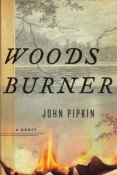True story: On April 30, 1844, Henry David Thoreau began the fire that eventually burned 300 acres of forest outside his home in Concord, Mass. He was never prosecuted for the act, but his neighbors shunned him for the next year, calling him "woods burner" behind his back. It was the year before he built his cabin at Walden Pond, penning what was to become the iconic American transcendentalist and environmentalist philosophy.
"Woods Burner," (Doubleday, 2009, $24.95) is poet and novelist John Pipkin's fictional exploration of that event, which he paints as a turning point not only for Thoreau, but also for several fictional characters as well. Pipkin's Thoreau has defaulted to following in his father's footsteps at the family pencil factory that spring, when he can't decide what path to follow:
"Plagued by indecision, Henry still defines his life by what it is not," Pipkin writes. "He is not a poet, though he has written poetry. He is not a philosopher, though he has spent many quiet nights examining his soul until its clumsy scaffolding seemed but a transparent nuisance. He is not an explorer, though he feels more at home beneath a canopy of trees than in the shadows of rooftops and steeples."
With the last of three matches procured from a shoemaker, Thoreau lights a fire to prepare a fish stew for himself and his fishing companion, Edward Sherman Hoar. But it's been a dry winter, and the small cook fire sparks the surrounding dry grass and leaves, pushed toward the woods by the wind.
Despite their best efforts, the two men are unable to control the flames, which take on a life of their own.
"The fire advances in a crooked line a dozen times the length of Henry's arm. The pine needles, though quick to ignite, are easily spent, hardly fuel enough to sustain the flames for more than a few seconds at a time. And the fire knows this; it behaves in accordance with its own set of a priori truths. It must keep moving and consuming to survive. The two men stomp in the grass like animals possessed, but already the fire senses the nearness of the woods. Like flowers turning sunward, the flames reach for the trees."
In the pages that follow, Pipkin entwines many lives he imagined changed because of Thoreau's fire. There are Thoreau's ruminations about cause and effect, and his fitful bursts of insight, but there's also Oddmund HusהOddԗa reticent, inward-turned Norwegian immigrant whose thoughts stray to his employer's buxom Irish wife, Emma Woburn, at the most inconvenient of times. There is prosperous, and slightly preposterous Boston bookseller Eliot Calvert, who fancies himself a playwright, and the opium-addled preacher Caleb Ephriam Dowdy, who mistakes the fire for his personal Armageddon.
As the fire nears Concord, the lives of these intricately drawn characters flow around and through one another like water, each searching for some glimpsed bright future that seems always just out of reach. And although the book might sound cerebral and inaccessible, Pipkin adroitly weaves in a ripping good yarn about men fighting their own mental and physical limitations alongside a massive blaze, armed with nothing more than shovels, axes, raw courage and bravado.
"They are too far from the river to form a line of swinging buckets, but a number of men have come straight from the tavern, bellies full with drink. They realize at onceas if through some unconscious concordancethat they have, each of them, brought ample stores of water, and with no women present they are free to make public use of private resources. One man and then another puts ideas into action; laughter erupts; trousers drop. A dozen men take part, and the nearest flames spit steam under the insult. The foul streams slacken, and the fire marches back over the barely dampened earth. The men retrieve themselves and fight on."
"Woods Burner," deftly weaves big thoughts about fate, religion, and commerce with the burgeoning adventure of America between the Revolutionary and Civil wars, and an unexpected good measure of humor. It's a novel carried effortlessly by Pipkin's engaging, provocative prose and the often-surprising stories of his characters, and culminates in an exciting battle of epic proportions against nature itself. It is, in Pipkin's capable hands, the event that will shape Thoreau's philosophy.
Like the almost irresistible urge to stare and meld with the dangerously destructive element of fire, readers will be pulled inexorably toward the heat ignited by the fires of each character's story. Whether stoked by a simple urge for connections or long-subsumed desire for glory, fire defines the characters, yet it is their all-too human passions and foibles that are at the heart of "Woods Burner." It is a book that will keep you up all night racing toward the last page, and then will leave you longing for more. Do yourself a favor and give up a day for this one.



Comments
Use the comment form below to begin a discussion about this content.
comments powered by Disqus